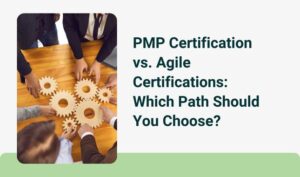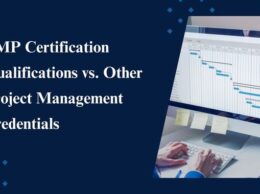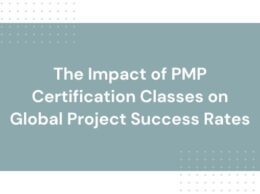Choosing between PMP (Project Management Professional) certification and Agile certifications can be a pivotal decision for your career in project management. While both are highly respected credentials, they serve different career goals, industries, and project management methodologies. This blog will explore the differences, benefits, and scenarios where one might outweigh the other, helping you make an informed decision.
Understanding PMP Certification
PMP certification, offered by the Project Management Institute (PMI), is a globally recognized credential based on the Project Management Body of Knowledge (PMBOK). It emphasizes a structured, linear approach to project management, suitable for industries requiring detailed planning, documentation, and compliance, such as construction, engineering, and healthcare.
Key Highlights of PMP Certification:
- Framework: Focuses on five phases—initiating, planning, executing, monitoring and controlling, and closing.
- Requirements: Demands extensive project management experience, formal education, and passing a rigorous exam.
- Industry Demand: Ideal for traditional industries with well-defined, large-scale projects.
- Career Impact: PMP-certified professionals earn, on average, 22% higher salaries than their non-certified counterparts
Understanding Agile Certifications
Agile certifications, such as Certified Scrum Master (CSM) or SAFe Agilist, center around Agile principles of flexibility, collaboration, and iterative project execution. These certifications are tailored for dynamic, fast-paced industries like software development, marketing, and IT.
Key Highlights of Agile Certifications:
- Approach: Emphasizes adaptability through methodologies like Scrum, Kanban, and Lean.
- Requirements: Vary by certification, often including training and a practical exam.
- Suitability: Ideal for projects where requirements evolve over time.
- Collaboration: Promotes teamwork and regular feedback to ensure alignment with customer needs
Comparison: PMP vs. Agile
| Attribute | PMP Certification | Agile Certifications |
| Focus | Structured project management | Flexibility and iterative development |
| Industries | Construction, healthcare, engineering | Software, IT, marketing |
| Planning | Extensive upfront planning | Continuous planning and iteration |
| Team Structure | Hierarchical | Collaborative and cross-functional |
| Scope | Fixed | Evolves with the project |
| Certification Cost | Higher (application, training, and exam) | Lower, varies by Agile framework |
PMP is perfect for projects requiring strict timelines, budgets, and stakeholder agreements. Agile certifications thrive in environments demanding quick pivots and innovative solutions
When to Choose PMP Certification
- You manage projects in structured environments: PMP is ideal for industries with well-defined deliverables.
- You seek global recognition: PMP’s prestige extends across various sectors worldwide.
- You aim for leadership roles: PMP certification often opens doors to senior positions, given its focus on managing large-scale, complex projects
When to Choose Agile Certifications
- Your projects require flexibility: Agile is optimal for industries like software where requirements evolve rapidly.
- You prioritize customer satisfaction: Agile’s iterative process allows frequent feedback, ensuring alignment with client needs.
- You want to work in tech-driven roles: Agile certifications are highly sought after in tech-based industries
Can You Have Both?
Absolutely! Combining PMP and Agile certifications can make you a versatile project manager. Many organizations operate hybrid models, where elements of both methodologies coexist. Having expertise in both domains positions you as a dynamic professional capable of adapting to diverse project needs.
Final Thoughts
The decision between PMP and Agile certifications depends largely on your career goals and the industries you aim to work in. If you thrive on structured methodologies and long-term planning, PMP certification is your best bet. However, if you enjoy adapting to changes and working in fast-paced environments, Agile certifications might be more rewarding.
Ultimately, both certifications enhance your credibility, skillset, and career prospects. For those unsure, starting with Agile can provide a foundation for tackling flexible projects, while PMP can be a long-term goal for broader, leadership-oriented opportunities.
FAQs
Can I pursue PMP and Agile certifications simultaneously?
Yes, you can. Combining both offers a well-rounded skill set, especially for hybrid project environments.
Which certification is better for career growth?
Both certifications are valuable. PMP often leads to higher salaries, while Agile certifications suit fast-growing industries like tech and marketing.
How much experience is required for PMP certification?
You need 36-60 months of project management experience, depending on your educational background.
What are the top Agile certifications?
Scrum Master (CSM), SAFe Agilist, and PMI-ACP (Agile Certified Practitioner) are popular Agile certifications.
Is PMP certification worth it in the Agile era?
Yes, especially for industries and roles requiring structured project management expertise.









